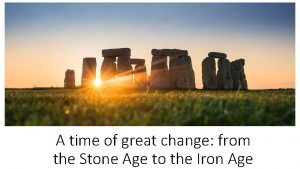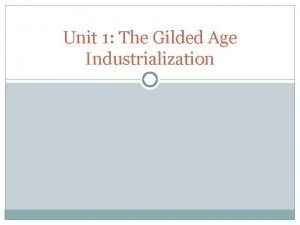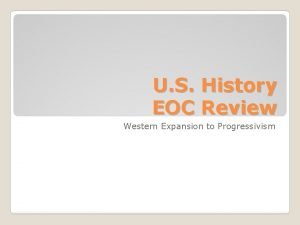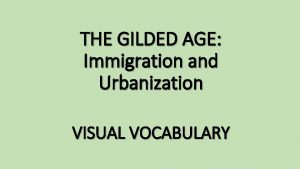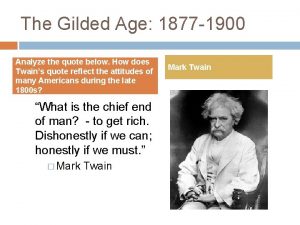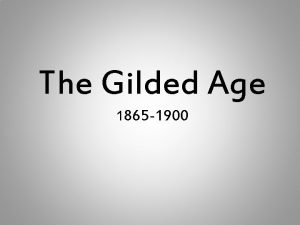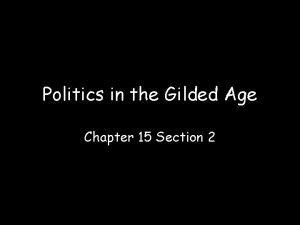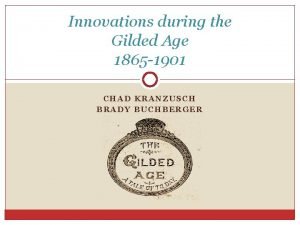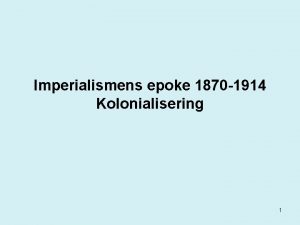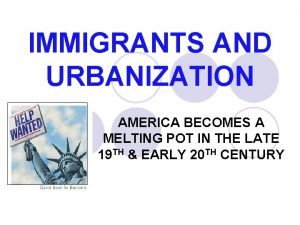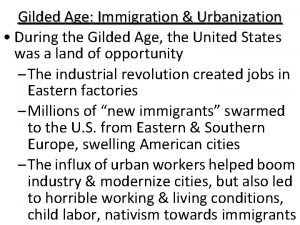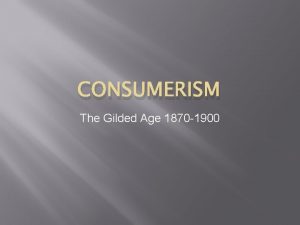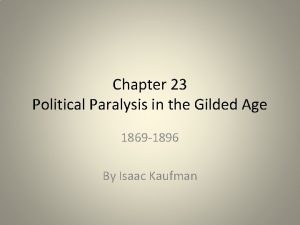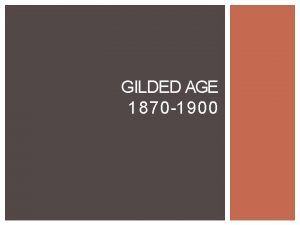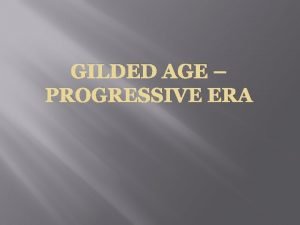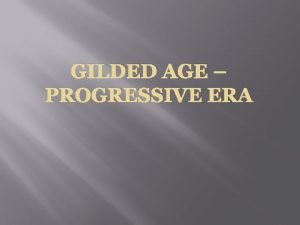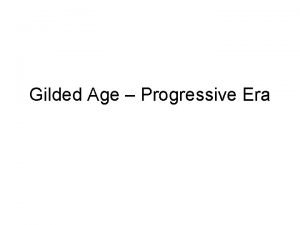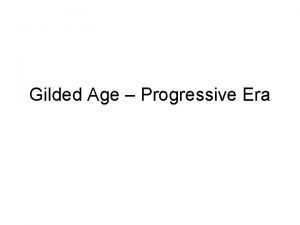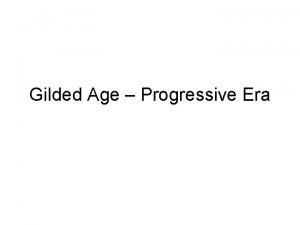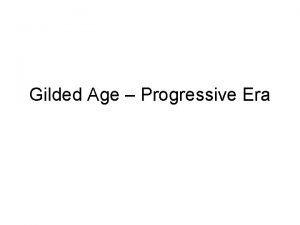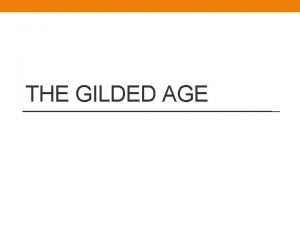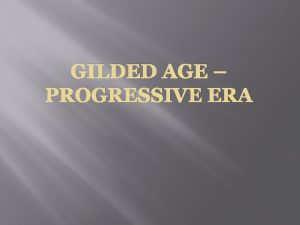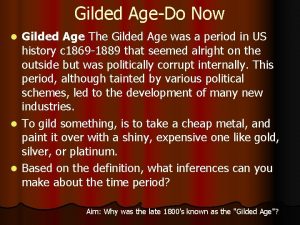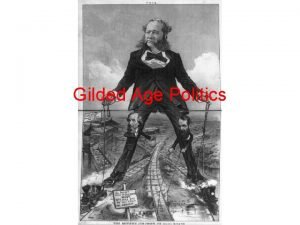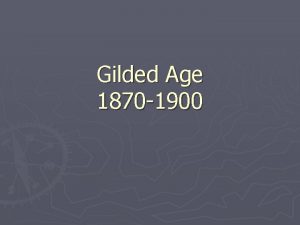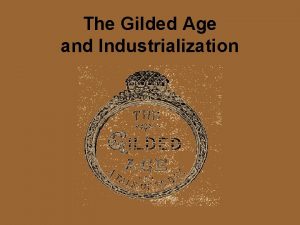Gilded Age Major Themes 1860s1900 Major Themes Why
















- Slides: 16

Gilded Age Major Themes 1860’s-1900

Major Themes • Why was it called the Gilded Age? • What does this term imply? • How does Mark Twain relate to this?

• gild 1 (g ld) • tr. v. gild·ed or gilt (g lt), gild·ing, gilds • 1. To cover with or as if with a thin layer of gold. • 2. To give an often deceptively attractive or improved appearance to. • 3. Archaic To smear with blood.

Gilded Age • • • Outside Factors End of Civil War Industrial Boom Material Progress America beginning to enter the world stage • Millionaires and Philanthropy • • Inside factors Rampant Corruption Discrimination Weak and Ineffective presidents • Labor exploited • Farmer Problems • Business Cycle

Political Seesaw • 80 -90% voter turnout • Presidential Election close – (10, 000 -40, 000 popular votes) • House of Reps changes 5 times

Forgettable Presidents • • • Grant (R) 1868 and ’ 72 Hayes (R) 1876 Garfield (R) 1880 and Arthur V. P Cleveland (D) 1884 Harrison (R) 1888 Cleveland (D) 1892

Laissez-faire Govt. • Govt. tried not to intervene in people’s lives and the economy • When it did, it usually sided with wealthy and conservative factions in the Gilded Age

Recurrent Issues… Parties saw eye to eye and tried to avoid • Tariff – High Tariff vs. Low Tariff – Industry vs. Farmer • Monetary Policy – Hard money vs. Soft/ Cheap – Creditors vs. Debtors – East vs. West – Industrialist vs. Farmer – Deflation vs. Inflation • Civil Service Pol. machines, Patronage and Spoils System vs. Reform

Political Parties Strong, competitive, commanded loyalty and produced high voter turnout • Democrats – Solid South and Northern industrial immigrant cities – Lutherans and Catholics – Resisted govt. efforts to impose morality • Republicans – Midwest and rural/ small town Northeast – Big Business – Puritan base – Codes of personal morality – Govt. to have role in regulating the economy – Support of Grand Army of the Republic (GAR) and Freedmen

Legacies of the Civil War • Elections – Waving the “Bloody Shirt” • Industry • Reconstruction • Race Relations

The Political Machine A Case Study of Gilded Age Politics Elected Official Party Boss Voters Corporations/ Business Local politics were controlled by bosses and political machines within the party.

Boss Tweed - William Tweed - Tammany Hall - Political Machine - Thomas Nast - New York Times

Ric Burns NY Clip on Tweed • http: //www. youtube. com/watch? v=Yild. L_il QFY

Major Themes Recap • Gilded Age: Mark Twain – Outside versus Inside • • Political Seesaw Forgettable Presidents Laissez-faire Government Recurrent Issues – Tariff, Civil Service, Monetary Policy • Political parties – Democrats and Republicans • Civil War Legacies


 Stone age chronology
Stone age chronology Iron age bronze age stone age timeline
Iron age bronze age stone age timeline Pictures
Pictures Entrepreneur gilded age
Entrepreneur gilded age Us cavalry general whose unwise and reckless
Us cavalry general whose unwise and reckless The gilded age vocabulary
The gilded age vocabulary Gilded age quotes
Gilded age quotes The gilded age time period
The gilded age time period Chapter 15 section 3 politics in the gilded age
Chapter 15 section 3 politics in the gilded age Gilded age inventions
Gilded age inventions Kolonialisering
Kolonialisering Melting pot gilded age
Melting pot gilded age Urbanization during the gilded age
Urbanization during the gilded age Presidents during gilded age
Presidents during gilded age Consumerism gilded age
Consumerism gilded age Chapter 23: political paralysis in the gilded age
Chapter 23: political paralysis in the gilded age Gilded age apush review
Gilded age apush review

